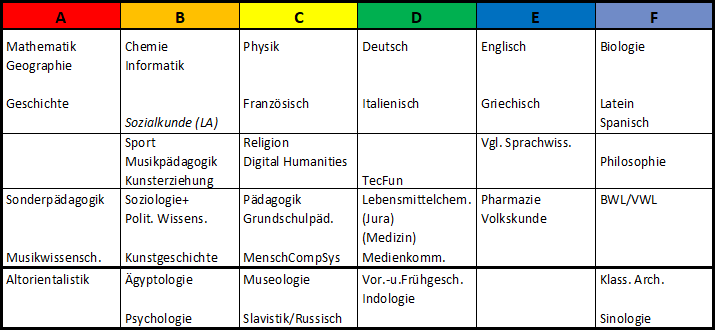Time slot model
There are currently almost 25,000 students enrolled at Julius-Maximilians-Universität. These are spread across around 280 Bachelor's/Master's degree programmes, five teacher training programmes and various state examination and doctoral degree programmes.
Many subject combinations are possible in the Bachelor's/Master's and teacher training programmes. It is the university's declared aim to offer students an overlap-free range of degree programmes in order to enable them to graduate within the standard period of study. For this reason, a time slot model was introduced to harmonise the courses offered by the subjects and faculties. Since the start of the 2012 summer semester, the entire university has been organising its courses according to the time slot model (version 2.0).
The focus of the time slot model is on the compulsory courses. These courses must not overlap in order to ensure that students graduate within the standard period of study.
The subjects and subject combinations offered at the Julius-Maximilians-Universität form the basis of the model. The subjects are categorised into six groups (A to F). This categorisation takes into account the characteristics of the degree programmes and the multiple use of courses as well as compulsory courses and teaching exports.
Compulsory courses for combined degree programmes are to be scheduled during the lecture period from Monday to Friday between 8:00 am and 6:00 pm. The lecture period is divided into blocks of 2 semester hours per week (SWS) each, which begin uniformly on even-numbered days. This means that there is always an average transfer time of half an hour between two blocks.
Each subject has 26 SWS of main time per week. Of this, 8 SWS are core time for compulsory courses that are offered once and 18 SWS are elective time for courses that are offered several times. In addition, 2 SWS of core time and 12 SWS of elective time are planned for the teacher training programmes in educational sciences.
The time slot model covers a period of five years. It therefore covers both the three-year Bachelor's degree programmes and the two-year Master's degree programmes, as well as the teacher training programmes. To ensure a fair distribution, the times for the subjects change within this period.
Implementing the time slot model according to the same principles across the university will result in greater reliability for teaching staff, students and administrative staff. In addition, better utilisation of resources is also associated with better scheduling of rooms.
The allocation of subjects to the groups was based on the calculation of the combinations that were not or very rarely chosen by students in recent years. It is therefore assumed that these subject combinations will not be chosen frequently in the future either and that this will not result in any disadvantages for the university or for students.
As a result of the time slot model, some subject combinations are restricted in their ability to be studied, as their core times and possibly elective times overlap. These are primarily all subjects that are assigned to the same group.
Corresponding subject combinations within a group can most likely only be studied with an extension of the standard period of study. Enrolment is still possible, but the degree programme is associated with corresponding difficulties.
Central Administration Unit A.3 Quality Management, Organisational Development and Campus Management System
Dr Christof Clausing, Phone: 0931 31-83103 E-mail: christof.clausing@uni-wuerzburg.de
Faculty of Catholic Theology
Rainer Albert, phone: 0931 31-81788 e-mail: r.albert@uni-wuerzburg.de
Faculty of Arts and Humanities
Markus Klingen, phone: 0931 31-88335 e-mail: markus.klingen@uni-wuerzburg.de
Faculty of Human Sciences
Petra Schulze, phone: 0931 31-84804 e-mail: Petra.Schulze@uni-wuerzburg.de
Faculty of Biology
PD Dr Ulrich Terpitz, Phone: 0931 31-84226 E-mail: ulrich.terpitz@uni-wuerzburg.de
Faculty of Chemistry and Pharmacy
Dr Peter Fischer, Phone: 0931 31-85353 Email: p.fischer@uni-wuerzburg.de
Faculty of Mathematics and Computer Science
Dr Robert Hartmann, phone: 0931 31-82099, e-mail: r.hartmann@mathematik.uni-wuerzburg.de
Dr Richard Greiner, phone: 0931 31-85029 e-mail: greiner@mathematik.uni-wuerzburg.de
Faculty of Physics and Astronomy
Dr Karsten Schutte, phone: 0931 31-83075 e-mail: schutte@physik.uni-wuerzburg.de
Faculty of Management and Economics
Jana Michel, phone: 0931 31-86490 e-mail: jana.michel@uni-wuerzburg.de
Miriam Sasse, phone: 0931 31-80264 e-mail: miriam.sasse@uni-wuerzburg.de
Teacher Training Programme
Lore Koerber-Becker, phone: 0931 31-81442 e-mail: Lore.Koerber-Becker@uni-wuerzburg.de







